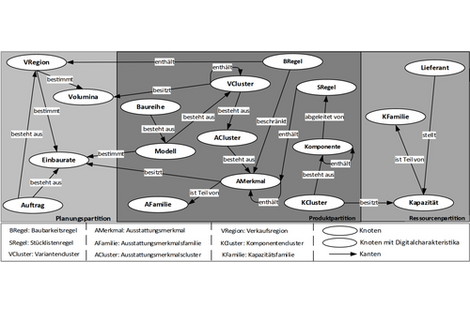
Demand and capacity management (DCM) is an elementary component of automotive manufacturers' supply chain management. The task of BKM is to synchronize the resource requirements resulting from the expected or already realized market demand with the capacities and restrictions of the supply chain and the production system (Figure 1). A major challenge for BKM is the uncertainty and volatility of requirements resulting from product diversity. Information technology is increasingly successful in supporting the complex BKM processes, whereby all systems are dependent on efficient and holistic product representation.
The automotive industry is currently confronted with two significant trends. On the one hand, the diversification of the powertrain (particularly in the context of e-mobility) is causing changes in the physical vehicle architecture. Secondly, the digitalization of the car (e.g. autonomous driving) is introducing new and changed dependencies between components (e.g. the compatibility of hardware and software). These new and changed dependencies must be appropriately documented when developing a product representation for the automotive BKM. The aim of Daniel Fruhner's dissertation is an efficient and flexible product representation for the BKM of automobile manufacturers for mapping logistics-relevant information of digitized vehicles.
Due to the accelerated changes in the automobile, a more flexible and efficient BKM process is required. Today, however, the BKM process is not based on all the required information. To address this problem, the process characteristics are identified on the basis of the BKM process variants. Literature research and expert interviews are used to determine requirements and product information from the company divisions that must be incorporated into the product representation. The product information from the company divisions is analyzed and segmented. Requirements and especially product information (digital characteristics), which must be integrated into the product representation for a holistic presentation due to the increasing digitalization of the automobile, are extracted.
The digital characteristics give rise to new dependencies to be integrated, as they have an influence on logistics. Further literature research is carried out to select the data structure and the concept for an efficient and flexible product representation for the BKM process. Based on the results, a graph-based ontology of efficient and flexible product representation is designed, which maps the logistics-relevant information of digitized vehicles (Figure 2). The efficient and flexible product representation is prototypically implemented and validated using a real use case of a German car manufacturer.
Daniel Fruhner completed his Bachelor's and Master's degrees in the Computer Science study program at Dortmund University of Applied Sciences and Arts. After gaining three years of practical experience as a software developer for embedded systems in the automotive industry, he returned to Fachhochschule Dortmund. Data structures and knowledge representations in automotive logistics were the focus of his research as a research assistant. From 2016 to 2022, he completed his doctorate in engineering as part of a cooperation between Dortmund University of Technology (LFO) and Fachhochschule Dortmund (IDiAL). He defended his dissertation on 03.06.2022.
Appraiser
- Prof. Dr. Michael Henke, Technische Universität Dortmund)
- Prof. Dr. Katja Klingebiel, (Fachhochschule Dortmund)
- Prof. Dr. Michael ten Hompel, (Technische Universität Dortmund)
- Prof. Dr. Andreas Brümmer, (Technische Universität Dortmund)
